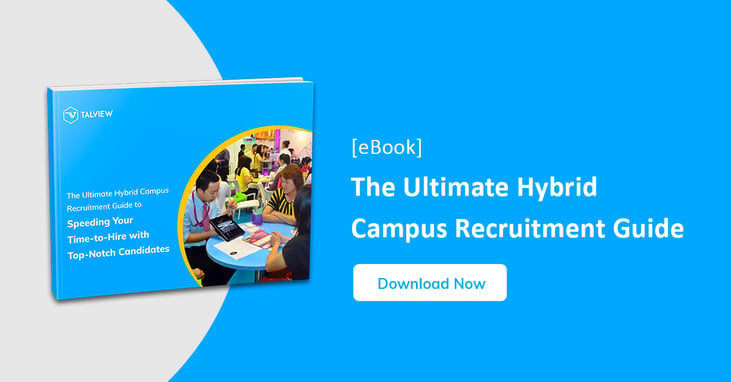Virtual recruiting technology isn’t new, but it has been taking an increasingly important role in both life and business over the past few years. In the midst of a dynamic, challenging labor market, the push to find qualified candidates has required businesses to take innovative approaches just to keep pace with their baseline hiring needs. Recruiters in particular came to understand that their campus recruiting efforts needed an upgrade if they were to successfully compete for candidates’ attention.
Since the beginning of 2020, the labor market has become more challenging than it ever was before. This was particularly true for college-age candidates, who became increasingly difficult to connect with as travel and event restrictions closed in-person channels of recruiting, including university campuses.
In-person Campus Hiring is Not the Most Efficient Strategy Anymore
In-person campus interviewing has its advantages. Talking to someone face-to-face and shaking hands help form a human connection. Or, at least they used to. The pandemic and our need to socially distance rocked the idea of “face to face.”
Those interviews had been a great way to build long-term relationships with future employees, school administrators and student organizations. Traveling to local or distant campuses offered a chance to get out of the office and see different perspectives at work. But it might also lead to be long sessions of talking to college students who didn’t know what they wanted to do, had unrealistic expectations or didn’t show up to hear about the opportunities offered by the company.
It also resulted travel delays, difficult weather and competition with class schedules and requirements, study sessions, exams or extracurricular commitments, as well as competition with other employers who also believed on-campus interviews were necessary in order to find the best candidates.
So what happened? Among other things, companies determined that in-person campus events had become unsustainable.
Think of the expenditures in travel, for example: hotel, transportation, meals, fees for each member of the team. Add the loss of time when the team could have been focused on actual recruiting or analyzing their recruiting results to strategize for the best plan going forward.
But perhaps the most critical reason why in-person campus recruiting doesn’t work is that campuses are not where the students are.
In 2022, the majority of college students will be Gen Z, and later Gen Alpha. They’re described as digital natives because they have been immersed from an early age in the use of technology. They’re highly tech-savvy. And they expect employers and recruiters to be the same.
Online Campus Recruiting is a Critical Tool for 2022
The global pandemic may have forced employers to adopt remote recruiting, but now that they’ve tried it, many have found it’s a highly efficient and effective way to meet college students where they are – online and on camera. As they do, employers should pursue a variety of strategies to connect with university students.
For example, asynchronous or pre-recorded interviews provide an opportunity for candidates to review questions and prepare their answers in advance. It also allows them to record their responses in a familiar setting, making the whole exercise less daunting. Asynchronous interviews are great for first looks and screening of candidates.
Social media is another way to meet students on their familiar territory. Even several years ago, at least 79% of job applicants were using social outlets to find new jobs. However, do your research about the channel up-front. Most people think of LinkedIn when considering social media and business, but college students are more likely to be found on:
-
YouTube
-
Reddit
-
Twitter
-
TikTok
-
Chat rooms, message boards, gaming sites
Also, providing an IRL (In Real Life) view of the company that uses streaming videos of the workplace is a great way to draw candidates in rather than trying to sell them via the recruitment process.
Finally, bear in mind that remote contact isn’t just for interviews and recruiting. Remote job fairs and internships have also proved to be a great use of technology and time.
The New Normal
Not too long ago, the college interviewing process extended through November. Now, however, a number of companies send out offers and expect responses by Thanksgiving. Some organizations take a hybrid approach by conducting most of their interviews virtually and limiting on-campus meetings to a few select locations.
Employers who embrace diversity, equity and inclusion are also targeting Historically Black Colleges and Universities (HBCUs) as well as organizations with diverse memberships, such as LGBTQ+, veterans, Latin X, the differently-abled and others.
Observers expect demand for college candidates to be strong, along with recruiting activity. In 2022, anyone who isn’t recruiting virtually from college campuses, is likely to be left behind.
Interested in more information on the hybrid campus recruitment process? Download the eBook: The Ultimate Hybrid Campus Recruitment Guide: Speeding Your Time-To-Hire with Top-Notch Candidates.








Leave a Reply